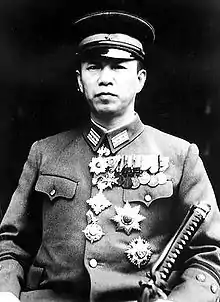Takushiro Hattori
Takushiro Hattori (服部 卓四郎, Hattori Takushirō, January 2, 1901 – April 30, 1960) was an Imperial Japanese Army officer and government official. During World War II, he alternately served as the chief of the Army General Staff's Operations Section and secretary to Prime Minister Hideki Tojo. Following the war's end, he served as an adviser on military matters to the postwar Japanese government.
Takushiro Hattori | |
|---|---|
 | |
| Born | January 2, 1901 Tsuruoka, Yamagata, Japan |
| Died | April 30, 1960 |
| Allegiance | Empire of Japan |
| Service/ | |
| Years of service | 1922–1945 |
| Rank | Colonel |
| Battles/wars | World War II (Pacific War) |
Takushiro Hattori was born on January 2, 1901 in Tsuruoka, a city in the Japanese prefecture of Yamagata. Upon completing his education at the Imperial Military Academy in 1922,[1] he enrolled in the Japanese Army War College where he graduated in 1930. In 1935, he traveled to Africa where he acted as the Japanese military's observer during the Italian invasion of Ethiopia.[2][3] After returning to Japan, he joined the Army General Staff Office and was placed in charge of mobilization.[4]
By the end of the 1930s, Hattori was promoted to lieutenant-colonel and became head of the Kwantung Army's Operations Section. In this capacity, he served as one of the driving forces behind the events that triggered the battle of Khalkin Gol.
Upon his promotion to colonel and chief of the operations section of the Army General Staff in 1941, Takushiro Hattori played a key role in planning the Japanese conquest of Western territories during the early years of World War II's Asia-Pacific Theater. In December 1942, he briefly resigned from this position and became Tojo's private secretary.[5] After Tojo's fall from power in July 1944, Hattori returned to the Army General Staff to reassume his prior position as chief of operations.[6] He subsequently remained in this position until a conflict with the Army's Military Affairs Bureau resulted in his transfer to a regimental command in China.[7]
In the years following the war, his name was mentioned in CIA documents as a plotter in a 1952 plan to kill the Japanese prime minister, Shigeru Yoshida.[8] In 1953, he wrote Dai Toa Senso Zenshi (The Complete History of the Great East Asia War), a large-scale military history of the Pacific War.
Notes
- "Report No. ZJJ-84: HATTORI Takushiro" (PDF). www.cia.gov. Central Intelligence Agency. 18 April 1952. p. 1. Retrieved 13 April 2020.
- Ibid.
- Welfield, John (2012) [1st pub. 1988]. An Empire in Eclipse: Japan in the Post-war American Alliance System. Bloomsbury Publishing plc. p. 68. ISBN 9781780933191.
- "Report No. ZJJ-72: HATTORI Takushiro and the HATTORI Organisation, Attachment C" (PDF). www.cia.gov. Central Intelligence Agency. 11 April 1952. p. 1. Retrieved 14 April 2020.
- "HATTORI Takushiro", p.1
- Ibid.
- Ibid. at 2.
- "CIA files reveal militarist plot to kill Yoshida in '52". The Japan Times. February 28, 2007.